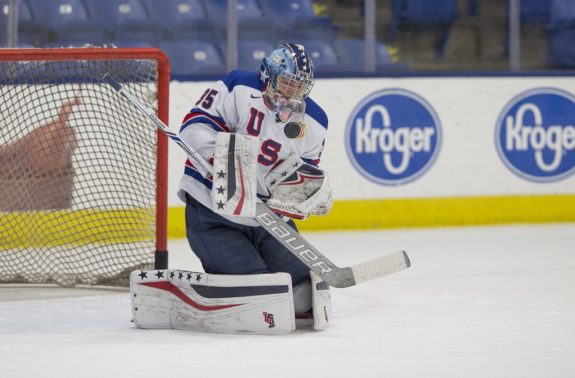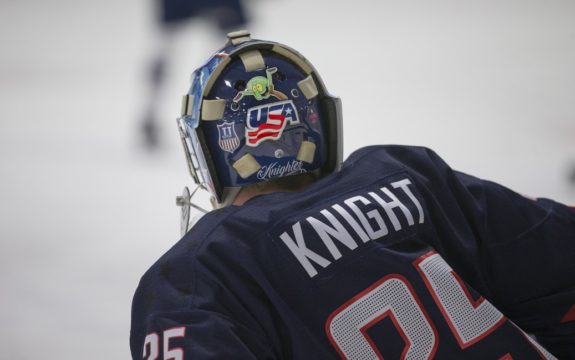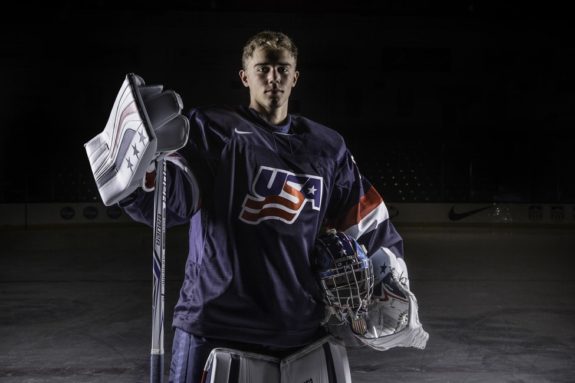Spencer Knight suited up for the World Junior Summer Showcase — a mini-tournament for 18 and 19-year-olds — at the ripe old age of 17, though he was hit or miss in his two performances. He let in five goals as a starter against an aggressive Canada-Red squad, and then let in none in relief against Finland — even when they had an extended 5-on-3 powerplay.
Despite that wide-range of success, there’s reason to believe he has a high ceiling and should make the World Junior Championship final roster this winter. Should that happen, he would be the first 17-year-old goalie to compete in the World Junior Championship since Jack Campbell in 2010. Knight’s habits and numbers prove he’s no fluke and destined for some good things with Team USA, and they need to let him have the chance to prove that.
A USA Hockey Product
Like many American players nowadays, Knight played in a junior-level branch with USA Hockey. The Connecticut-native joined the National Team Development Program (NTDP) to play for their U17 team.

Knight was the backup to Cameron Rowe, who shouldered over 2,200 minutes while Knight managed just 1,200. Through those minutes with that squad, he had a 2.55 goals against average (GAA) and a .915 save percentage (SV%). Both those numbers are better than his counterpart’s, but would he still have been better than Rowe had he played the same number of minutes? Let’s look at goals against average specifically.
Knight let in 52 goal and Rowe let in 135. Let’s theorize what would happen if Knight would have duplicated Rowe’s stats; in the 1,000 extra minutes Knight would get, he would have to let up 83 goals. That means he would have a goals against per minute of 0.08 in those thousand minutes. In other words, he would be letting up about five goals a game for roughly sixteen games. This would have made his GAA 3.77 for the season, which is just a tad bit worse than Rowe’s 3.64.
Realistically, it would have been near impossible for Knight to put up worse numbers than Rowe, even if they played the same number of minutes. It would have taken Knight going from letting in around three goals a game to five for his numbers to dip like that. If Knight had actually played 2,200 minutes and his stats dropped in the later part of the season due to fatigue, his GAA would have — at worst — hung around 3.50. Even at that, his collective GAA would have barely jumped over three.
Theoretically, he was the best goalie on the U17 team.
In reality, he was also the best goalie on the U17 team.

There was a reason the U18 team called-up an under-ager partway through the season and there’s a reason that it was Knight. He appeared in nine games for the U18 team before his 17th birthday. After his birthday, he played five more games with them, finishing out the Five Nations tournament with the United States’ U18 team.
He will be with the U18 team for one more year before he heads off to Boston College in 2019, a place that will boost his development like no other. In fact, he’s already close to a former BC Eagle in Thatcher Demko.
Demko and Knight have grown close due to the Warren Strelow National Team Goaltending Camp, a camp in which professional goalies work with amateur goalies as mentors and Demko has some good things to say about Knight.
“I don’t want to pump his tires too much but he is beyond his years in terms of technical play and maturity,” Demko said of Knight. “I try to have good practice habits and it can be good to see an older guy and what it’s like at the next level and in the offseason, that [the switch] doesn’t just get flipped off. It’s good to be around each other.”

Demko is a perfect example of how important development is. He went from being 17th and 28th among all goalies in GAA and SV%, respectively, his freshman year to seventh and fourth in his junior year. So, if Demko is saying Knight is developing well, Demko knows what he’s talking about.
It’s hard to judge where Knight lies on the maturity spectrum from the outside looking in, but he’s for sure as good as Demko thinks he is on the technical side; his numbers wouldn’t be so good if he wasn’t so good himself. And, should he replicate those numbers again this year, that will speak for itself.
What He Brings to Team USA
There are two sides to this coin. One is, what does Knight have that another goalie older than him doesn’t have? Older goalies have more experience under their belts at high levels and can prove they can maintain quality numbers consistently. Knight is a grab bag — are you going to continue getting solid numbers out of him or will he start to slide? He already did well in one game in the World Junior Summer Showcase, and not too well in another.
But then there’s the side of, what does being 17 have to do with any of it? Jack Hughes is considered better than most all his peers at the WJSS and he’s less than a month younger than Knight. Consistency is only considered a problem with young players because they haven’t had the chance to have sustained success — it’s not that they’re not capable of it. Knight only had two chances to prove himself in the WJSS, and that’s a very small sample size.
Jack Campbell, as mentioned earlier, played in the WJC as a 17-year-old. He, too, went through the NTDP. At age sixteen he was playing on the U17 team and, later, the U18 team. In fact, he played more with the seventeen-year-olds than he did with his own age group. He competed in the WJC-18 tournament and won gold. The next year he’d do the same. He also joined the WJC U20 team the same year. He won gold after three appearances. Needless to say, he became a highly touted prospect, which could be in store for Knight.
Campbell and Knight are following near identical paths at this rate. Campbell has been in the AHL for six years, with his play reaching a new level in the LA Kings organization. Knight could follow the same path, and who wouldn’t want a potential professional goaltender in net?
The fact of the matter is that the United States needs a goalie to backup Cayden Primeau, so they need someone to handle a handful of games in the preliminary round, which is fairly low-pressure, relatively speaking. Given his track history of success and the high ceiling he has, there’s no reason for the US to not take a chance on Knight and name him to the final roster as a back-up.